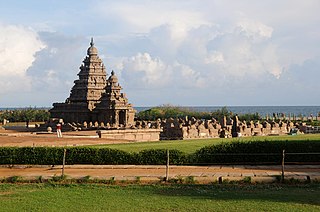
Tamil Nadu is the southernmost state of India. The tenth largest Indian state by area and the sixth largest by population, Tamil Nadu is the home of the Tamil people, who speak the Tamil language—the state's official language and one of the longest surviving classical languages of the world. The capital and largest city is Chennai.

Madurai, formerly known by its colonial name Madura is a major city in the Indian state of Tamil Nadu. It is the cultural capital of Tamil Nadu and the administrative headquarters of Madurai District, which is governed by the Madurai Municipal Corporation established in 1 November 1866. As of the 2011 census, it is the third largest metropolis in Tamil Nadu after Chennai and Coimbatore in terms of population and 27th largest urban agglomeration in India. Located on the banks of River Vaigai, Madurai has been a major settlement for two millennia and has a documented history of more than 2500 years. It is often referred to as "Thoonga Nagaram", meaning "the city that never sleeps".

The Tamils, also known as the Tamilar, are a Dravidian ethnolinguistic group who natively speak the Tamil language and trace their ancestry mainly to the southern part of the Indian subcontinent. The Tamil language is one of the longest-surviving classical languages, with over two thousand years of written history, dating back to the Sangam period. Tamils constitute about 5.7% of the Indian population and form the majority in the South Indian state of Tamil Nadu and the union territory of Puducherry. They also form significant proportion of the population in Sri Lanka (15.3%), Malaysia (7%) and Singapore (5%). Tamils have migrated world-wide since the 19th century CE and a significant population exists in South Africa, Mauritius, Fiji, as well as other regions such as the Southeast Asia, Middle East, Caribbean and parts of the Western World.

The Vaigai is a river in the Tamil Nadu state of southern India; it passes through the towns of Theni, Madurai and Ramanathapuram. It originates in Varusanadu Hills, the Periyar Plateau of the Western Ghats range, and flows northeast through the Kambam Valley, which lies between the Palani Hills to the north and the Varushanad Hills to the south. The Vattaparai Falls are located on this river. As it rounds the eastern corner of the Varushanad Hills, the river turns southeast, running through the region of Pandya Nadu. Madurai, the largest city in the Pandya Nadu region and its ancient capital, lies on the Vaigai. The river empties into the Palk Bay near Alagankulam, close to Pamban Bridge in Ramanathapuram District.
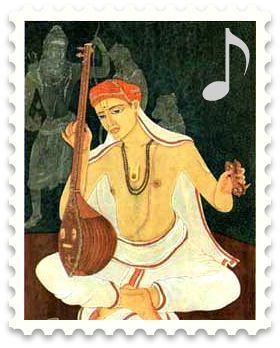
Indian folk music is diverse because of India's enormous cultural and traditional diversity. It is sung in various languages and dialects throughout the length and breadth of this vast nation and exported to different parts of the world owing to migration.

The Kalaimamani is the highest civilian award in the state of Tamil Nadu, India. These awards are given by the Tamil Nadu Iyal Isai Nataka Mandram, a unit of the Directorate of Art and Culture, Government of Tamil Nadu, to recognise artists in the state for their achievements.
Various dance forms are practiced in Tamil Nadu, the southernmost state of India. Tamil Nadu is the home of the Tamil people, who speak Tamil language, one of the oldest surviving languages in India. With archaeological evidence pointing to the Tamilakam region being inhabited for more than 3,800 years, Tamil culture has seen multiple influences over the years and has developed diversely. With its diverse culture, many forms of individual and group dances have their origins in the region.
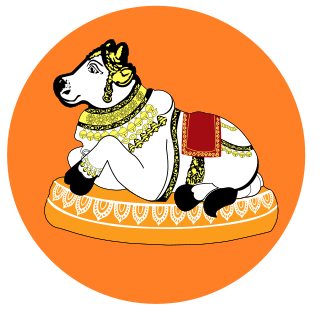
The Paadal Petra Sthalam, also known as Tevara Sthalam, are 276 temples that are revered in the verses of Shaiva Nayanars in the 6th-9th century CE. The Divya Desams by comparison are the 108 Vishnu temples glorified in the poems of the contemporary Vaishnava Alvars of Tamil Nadu, India.

Lesbian, gay, bisexual and transgender (LGBT) rights in Tamil Nadu are the most progressive among all states of India. Tamil Nadu was the first state in India to introduce a transgender welfare policy, wherein transgender individuals can access free gender affirmation surgery in government hospitals and various other benefits and rights. The state was also the first to ban forced sex-selective surgeries on intersex infants, and also the first state to include an amendment in its state police guidelines that expects officers to abstain from harassing the LGBTQIA+ community and its members. The state also became the first to ban conversion therapy as well as the first to introduce LGBTQIA+ issues in school curricula.

Vijayalakshmi Navaneethakrishnan is a Tamil folk singer and composer and a renowned exponent of Tamil folk art. Together with her husband M. Navaneethakrishnan, she has conducted several years of research and study on Tamil folk music and dances and devoted a lifetime to research, collection, revival, and documentation of ancient Tamil folk songs and dances, many of which are fast becoming obsolete. The Government of India has announced Padma Shri, the nation's fourth highest civilian award, for the year 2018 to the singer for her extraordinary contribution in her field.
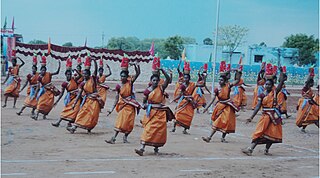
Karakattam, or Karagam Puja in the Caribbean, is an ancient folk dance of Tamil Nadu performed in praise of the rain goddess Mariamman. The ancient Tamil epic says that this type of dance derived from Bharatham and a mixture of multiple forms of Tamil dance forms like Bharatanatyam postures and mudras. The offering of this dance is to the goddess to bless rain. The dance accompanies songs like folk Carnatic (Amrithavarshini).

Echampati Gayathri, popularly known as "Veena Gayathri"(born 9 November 1959) is a veena exponent of the traditional Carnatic music. She was appointed by the Chief Minister of Tamil Nadu, J.Jayalalithaa, as the first Vice Chancellor of Tamil Nadu Music and Fine Arts University in November, 2013.

Tamil culture refers to the culture of the Tamil people. The Tamils speak the Tamil language, one of the oldest languages in India with more than two thousand years of written history.
Tamil Nadu is the southernmost state of India located on south-eastern coast of the Indian peninsula. The state is straddled by Western Ghats and Eastern Ghats to the west and north and the waters of Bay of Bengal and Andaman Sea on the other two sides. It is the home of the Tamil people, who speak Tamil language, one of the oldest surviving languages. The capital and largest city is Chennai which is known as the "Gateway to South India". As of 2021, the state is the most visited and has received the most number of tourists amongst all states of India.

The Pancha Sabhai Sthalangal refers to the temples of Nataraja, a form of the Hindu god Shiva where he is regarded to have performed the cosmic dance called the Tandava. All these temples are located in Tamil Nadu, India. The five dance performances were the Kali Tandava at Ratna Sabha in Vada Aaranyeswarar Temple, Ananda Tandava at the Kanaka Sabha in Natarajar Temple, Sandhya Tandava at the Rajata Sabha in Meenakshi Amman Temple, Muni Tandava at the Tamra Sabha at Nellaiappar Temple, and Tripura Tandava at the Chitra Sabha in Kutralanathar Temple.
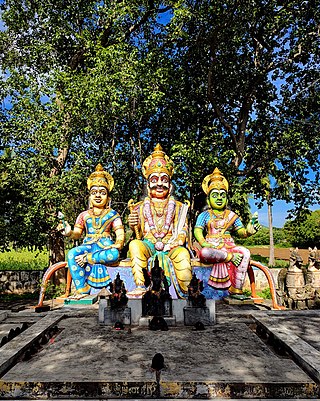
The early Dravidian religion constituted a non-Vedic, pre-Indo-Aryan, indigenous religion practiced by Dravidian peoples in the Indian subcontinent that they were either historically or are at present Āgamic. The Agamas are non-Vedic in origin, and have been dated either as post-Vedic texts, or as pre-Vedic compositions. The Agamas are a collection of Tamil and Sanskrit scriptures chiefly constituting the methods of temple construction and creation of murti, worship means of deities, philosophical doctrines, meditative practices, attainment of sixfold desires and four kinds of yoga. The worship of tutelary deities and sacred flora and fauna in Hinduism is also recognized as a survival of the pre-Vedic Dravidian religion. Dravidian linguistic influence on early Vedic religion is evident; many of these features are already present in the oldest known Indo-Aryan language, the language of the Rigveda, which also includes over a dozen words borrowed from Dravidian. The linguistic evidence for Dravidian impact grows increasingly strong as one moves from the Samhitas down through the later Vedic works and into the classical post-Vedic literature. This represents an early religious and cultural fusion or synthesis between ancient Dravidians and Indo-Aryans that went on to influence Indian civilisation.

The Tamil Nadu Dr. J. Jayalalithaa Music and Fine Arts University (TNJMFAU), formerly and commonly known as Tamil Nadu Music and Fine Arts University (TNMFAU), is a government music and fine arts university situated in Adyar in the southern part of the city of Chennai, Tamil Nadu, India. It is about 14 km (8.7 mi) from the Chennai International Airport and about 10 km (6.2 mi) from the Puratchi Thalaivar Dr. M.G. Ramachandran Central Railway Station. It is one of the premier music and fine arts universities named after the former chief minister of Tamil Nadu J. Jayalalithaa.
Madurai Narayanan Krishnan (1928–2005) was an Indian musician, known for his proficiency in carnatic music. He was known to have been proficient in all the three facets of music viz. vocals, lyrics and music and was considered by many as a Vaggeyakara. The Government of India awarded him the Padma Shri, the fourth highest civilian award in 1992 and followed it up with the Padma Bhushan, the third highest civilian award, in 2003. He was also a recipient of the Sangeet Natak Akademi Award, UNESCO Award and the Kalaimamani Award.














